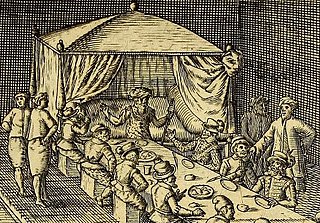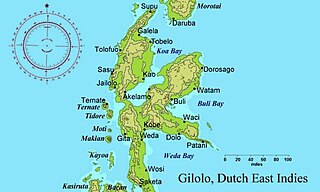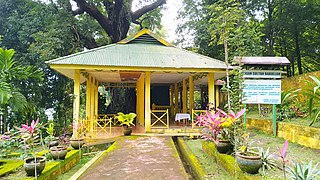Related Research Articles

North Maluku is a province of Indonesia. It covers the northern part of the Maluku Islands, bordering the Pacific Ocean to the north, the Halmahera Sea to the east, the Molucca Sea to the west, and the Seram Sea to the south. It shares maritime borders with North Sulawesi, Southeast Sulawesi and Central Sulawesi to the west, Maluku to the south, Southwest Papua to the east, and Palau and the Philippines to the north. The provincial capital is Sofifi, mostly part of the city of Tidore Islands on the largest island of Halmahera, while the largest city is the island city of Ternate. The population of North Maluku was 1,038,087 in the 2010 census, making it one of the least-populous provinces in Indonesia, but by the 2020 Census the population had risen to 1,282,937, and the official estimate as at mid 2023 was 1,328,594.

The Sultanate of Ternate, previously also known as the Kingdom of Gapi is one of the oldest Muslim kingdoms in Indonesia besides the sultanates of Tidore, Jailolo, and Bacan.

The Sultanate of Tidore was a sultanate in Southeast Asia, centered on Tidore in the Maluku Islands. It was also known as Duko, its ruler carrying the title Kië ma-kolano. Tidore was a rival of the Sultanate of Ternate for control of the spice trade and had an important historical role as binding the archipelagic civilizations of Indonesia to the Papuan world. According to extant historical records, in particular the genealogies of the kings of Ternate and Tidore, the inaugural Tidorese king was Sahjati or Muhammad Naqil whose enthronement is dated 1081 in local tradition. However, the accuracy of the tradition that Tidore emerged as a polity as early as the 11th century is considered debatable. Islam was only made the official state religion in the late 15th century through the ninth King of Tidore, Sultan Jamaluddin. He was influenced by the preachings of Syekh Mansur, originally from Arabia. In the 16th and 17th centuries, the Sultans tended to ally with either Spain or Portugal to maintain their political role but were finally drawn into the Dutch sphere of power in 1663. Despite a period of anti-colonial rebellion in 1780–1810, the Dutch grip on the sultanate increased until decolonization in the 1940s. Meanwhile, Tidore's suzerainty over Raja Ampat and western Papua was acknowledged by the colonial state. In modern times, the sultanate has been revived as a cultural institution.

The Sultanate of Bacan was a state in Maluku Islands, present-day Indonesia that arose with the expansion of the spice trade in late medieval times. It mainly consisted of the Bacan Islands but had periodical influence in Ceram and the Raja Ampat Islands. It fell under the colonial influence of Portugal in the 16th century and the Dutch East India Company (VOC) after 1609. Bacan was one of the four kingdoms of Maluku together with Ternate, Tidore and Jailolo, but tended to be overshadowed by Ternate. After the independence of Indonesia in 1949, the governing functions of the sultan were gradually replaced by a modern administrative structure. However, the sultanate has been revived as a cultural entity in present times.
Zainal Abidin ; born Tidore Wonge or Gapi Buta ) was the 18th or 19th ruler of the Ternate Sultanate of Maluku, located in modern-day Indonesia. His life is only described in sources dating from the 16th century or later. According to these sources he was the first ruler of Ternate to use the title Sultan rather than Kolano, or king, and enacted a number of changes in the government, based on Islamic Law, technically transforming Ternate into an Islamic kingdom.

Sultan Babullah, also known as Sultan Baabullah was the 7th Sultan and 24th ruler of the Sultanate of Ternate in Maluku who ruled between 1570 and 1583. He is known as the greatest Sultan in Ternatan and Moluccan history, who defeated the Portuguese occupants in Ternate and led the Sultanate to a golden peak at the end of the 16th century. Sultan Babullah was commonly known as the Ruler of 72 (Inhabited) Islands in eastern Indonesia, including most of the Maluku Islands, Sangihe and parts of Sulawesi, with influences as far as Solor, East Sumbawa, Mindanao, and the Papuan Islands. His reign inaugurated a period of free trade in the spices and forest products that gave Maluku a significant role in Asian commerce.
Sultan Hairun Jamilu was the 6th Muslim ruler of Ternate in Maluku, reigning from 1535 to 1570. During his long reign, he had a shifting relation to the Portuguese who had a stronghold in Ternate and tried to dominate the spice trade in the region. This ended with his assassination at the hands of a Portuguese soldier in 1570.
Bayan Sirrullah was the second Sultan of Ternate in Maluku. He is also known as Abu Lais or Kaicili Leliatu. He ruled from perhaps 1500 to 1521 and is important as the first east Indonesian ruler who made contact with the encroaching Portuguese.
Dayal also known as Hidayatullah was the fourth Sultan of Ternate in Maluku. He had a short and largely nominal reign between 1529 and 1533 before fleeing Ternate due to Portuguese pressure. He later tried to create an anti-Portuguese alliance among the kings in North Maluku, but was mortally wounded in battle against the Europeans.

Sultan Saidi Berkat was the eighth Sultan of Ternate in the Maluku Islands. His capital and seat of power was in the city of Ternate. He succeeded to the extensive east Indonesian realm built up by his father Sultan Babullah, reigning from 1583 to 1606. The Spanish, who colonized the Philippines and had interests in Maluku, repeatedly tried to subdue Ternate, but were unsuccessful in their early attempts. Saidi's reign coincides with the arrival of the Dutch in Maluku, which indirectly caused his deposal and exile through a Spanish invasion.
Sultan Mudafar Syah I, also spelt Muzaffar Syah, was the ninth Sultan of Ternate who ruled from 1606 to 1627. He reigned during an important transitional phase, when the Dutch East India Company gained ascendency in the Maluku Islands and began to regulate the commerce in spices. This was the beginning of the colonial subordination of Maluku that would accelerate during his successors.
Sultan Mandar Syah was the 11th Sultan of Ternate who reigned from 1648 to 1675. Like his predecessors he was heavily dependent on the Dutch East India Company (VOC), and was forced to comply to Dutch demands to extirpate spice trees in his domains, ensuring Dutch monopoly of the profitable spice trade. During the Great Ambon War in the 1650s, Mandar Syah sided with the VOC but was nevertheless pushed to cede control over areas in Central Maluku. On the other hand, the Ternate-VOC alliance led to a large increase of Ternatan territory in the war with Makassar in 1667.
Sultan Sibori Amsterdam was the twelfth Sultan of Ternate in the Maluku Islands who reigned from 1675 to 1690. He participated in the last outburst of armed resistance against the Dutch East India Company (VOC) in 1679–1681, but was eventually forced to sign a new treaty that reduced Ternate to a mere vassal of the Company. In that way he was the last formally independent Sultan before the onset of early-modern Dutch colonialism.
Marhum, was, according to late tradition, the eighteenth King or Kolano of Ternate in the Maluku Islands. He supposedly ruled between 1465 and 1486, being the first king to adopt Islam. His name merely means "The Late", "The Deceased", and he is probably the same person as King Gapi Baguna II, mentioned in several other chronicles and king lists. His son, Zainal Abidin, became the first Sultan of Ternate.
Ciri Leliatu (Ciriliyati) (Jawi: چلياتي); or Sultan Jamaluddin (سلطان جمال الدين; fl. late 15th/early 16th century) was the first Sultan of Tidore in Maluku Islands, who reigned at a time when Islam made advances in this part of Indonesia because of contacts brought about by the increased trade in spices. He is also sometimes credited with the first Tidorese contacts with the Papuan Islands.
Sultan Mir ; or Amiruddin Iskandar Dulkarna'in was the third Sultan of Tidore in Maluku Islands. He had a long and troubled reign from 1526 to the 1550s where he tried to counter the hegemonic ambitions of the Portuguese and their Ternate allies. The global rivalries between Spain and Portugal characterized the period, and the two Iberian powers indiscriminately involved the spice sultanates Tidore and Ternate in their power game.

The pre-Islamic rulers of Ternate lorded over the leading spice-producing kingdom in the Maluku Islands in present-day Indonesia. They are known from several partly different historical traditions. One version commences with Cico, a chief of the coastal village Sampalu who obtained a mystical golden mortar and pestle and was elected king (Kolano) by the chiefs of the islands. Other versions start with Mashur-ma-lamo, son of the Arab immigrant Jafar Sadik and a heavenly nymph. Ternate was part of a ritual quadripartition together with the kingdoms of Tidore, Jailolo and Bacan. After many generations, King Tidore Wonge converted to Islam and became Sultan under the name Zainal Abidin (1486?-1500?).

The Sultanate of Jailolo was a premodern state in Maluku, modern Indonesia that emerged with the increasing trade in cloves in the Middle Ages. Also spelt Gilolo, it was one of the four kingdoms of Maluku together with Ternate, Tidore, and Bacan, having its center at a bay on the west side of Halmahera. Jailolo existed as an independent kingdom until 1551 and had separate rulers for periods after that date. A revivalist Raja Jailolo movement made for much social and political unrest in Maluku in the 19th century. In modern times the sultanate has been revived as a symbolic entity.

Foramadiahi is a village on Ternate island in North Maluku, Indonesia. It has a prominent role in stories about the formation of the Ternate Kingdom and has a number of historical graves.
References
- ↑ Clercq, F. S. A. de (Frederik Sigismund Alexander) (1890). Bijdragen tot de kennis der residentie Ternate. Smithsonian Libraries. Leiden, E.J. Brill.
- ↑ Hubert Jacobs (1971) A treatise on the Moluccas (c. 1544). Rome: Jesuit Historical Institute, p. 81-3.
- ↑ François Valentijn (1724) Oud en Nieuw Oost-Indien, Vol. I. Amsterdam: Onder den Linden, p. 134-5.
- ↑ Leonard Y. Andaya (1993) The world of Maluku. Honolulu: University of Hawai'i Press, p. 50.
- ↑ Leonard Y. Andaya (1993), p. 50-1.
- ↑ François Valentijn (1724), p. 135.
- ↑ Naïdah (1878) "Geschiedenis van Ternate", Bijdragen tot de Taal-, Land- en Volkenkunde 26-1, p. 437-40.
- ↑ Seung-Won Song (2020). "A heavenly nymph married to an Arab sayyid: Stranger-kingship and diarchic divisions of authority as reflected in foundation myths and rituals in North Maluku, Indonesia", Indonesia and the Malay World 48, p. 116-135.
- ↑ Naïdah (1878), p. 492.
- ↑ C.F. van Fraassen (1987) Ternate, de Molukken en de Indonesische Archipel. Leiden: Rijksmuseum te Leiden, Vol. I, p. 16-8.
- ↑ C.F. van Fraassen (1987), Vol. II, p. 6-8.
- ↑ Peter Lape (2005) "Archaeological approaches to the study of Islam in Island Southeast Asia", Antiquity 79, p. 833.
- ↑ C.F. van Fraassen (1987), Vol. II, p. 10.
- ↑ Hubert Jacobs (1971), p. 83-5.